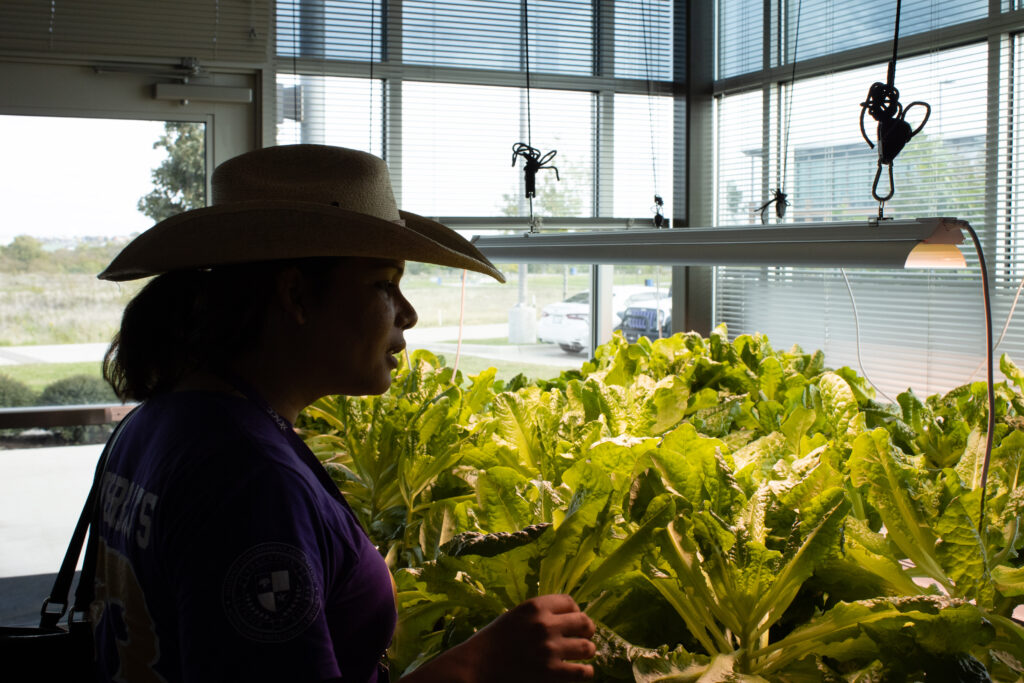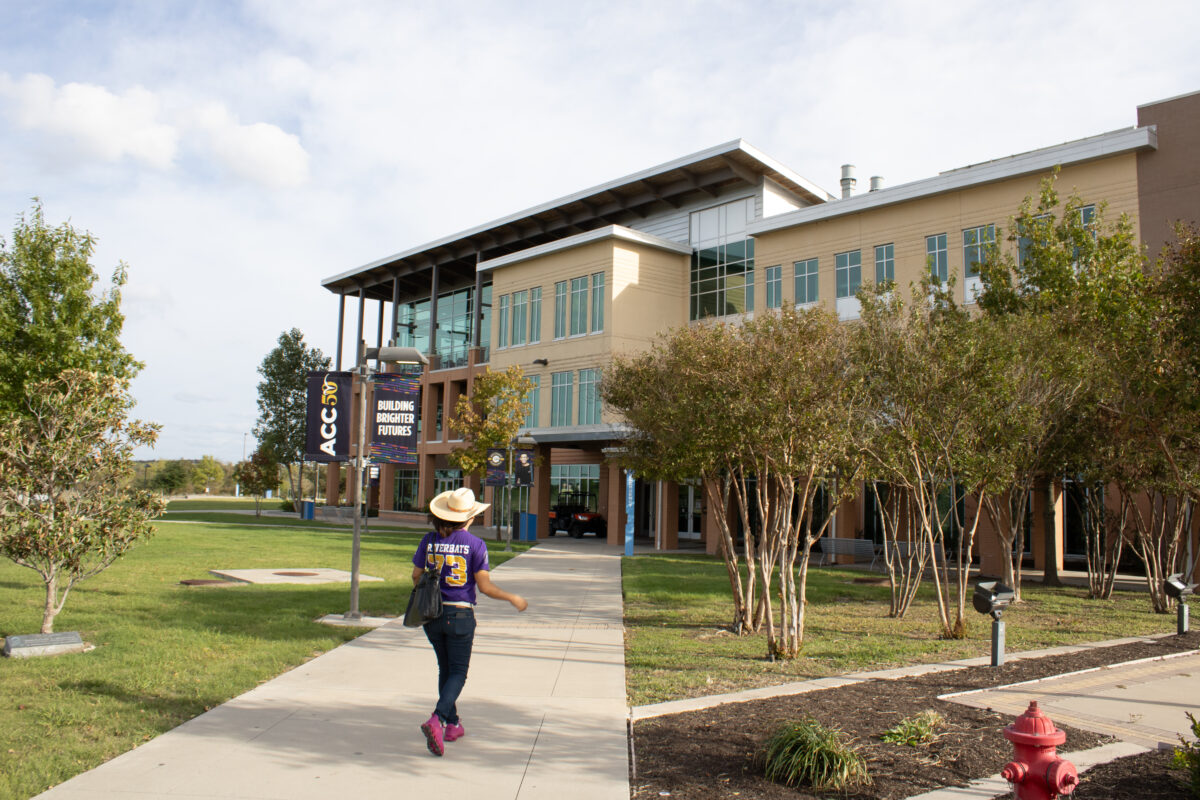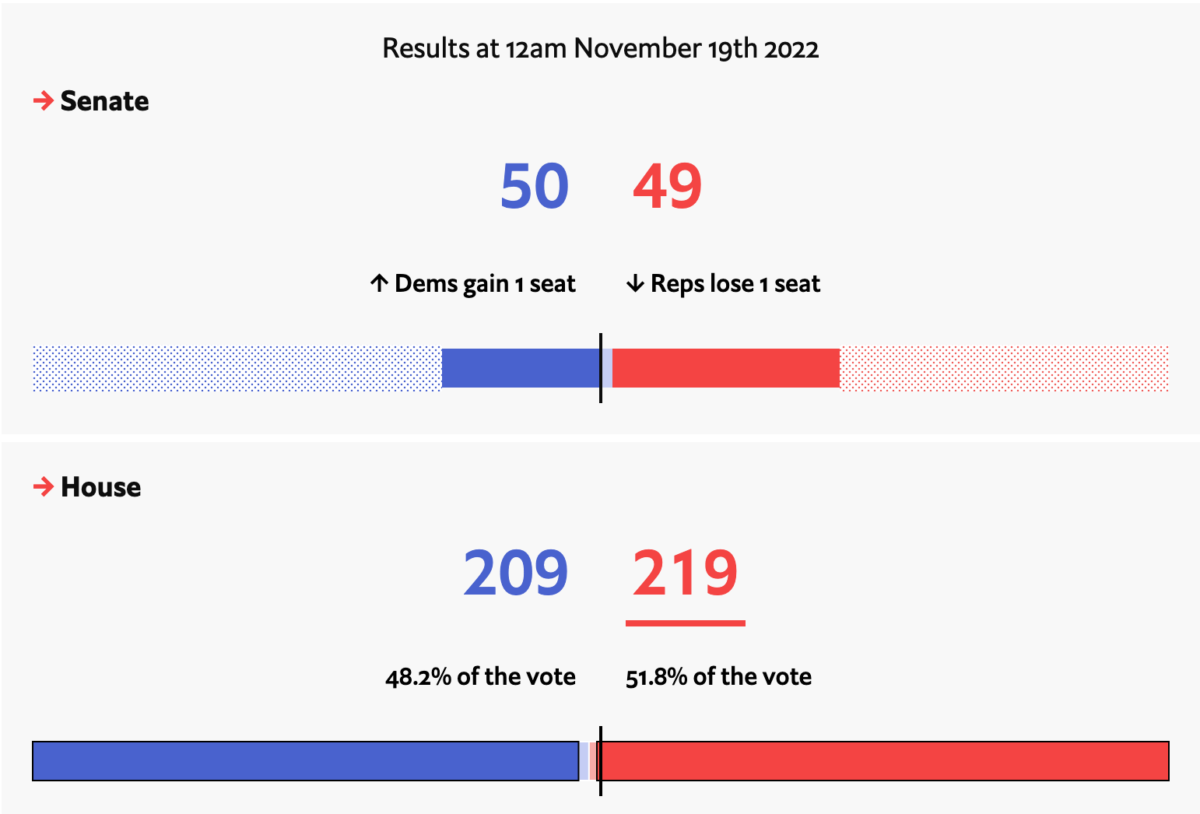By Tiara Allen
Photos By Jaime Bajanero
This article was featured in the Fall 2023 issue of ACCENT Magazine
ACC’s Elgin campus is the district’s easternmost campus and services students in Elgin ISD, Bastrop County and eastern Travis County. It is also the home base for ACC’s Veterinary Technician and Sustainable Agriculture Entrepreneurship programs, and has 17 acres of student-run farmland. However, the campus, alongside services such as the library, the counseling center, and the Learning Lab, is only open from 8 a.m. to 5 p.m. on Monday through Friday, and has no weekend hours.
In contrast, most other ACC campuses open at 7 a.m. and close at 10 p.m. or 10:30 p.m. on Mondays through Thursdays, with more limited hours on Fridays, Saturdays, and Sundays. San Gabriel Campus is the only other exception; it closes at 8 p.m. on Mondays through Thursdays, which still offers a three hour increase for students – one that some students believe would make a significant difference.
Elisha MacGregor, an ACC student and Elgin resident, is displeased with the limited campus hours and course selections at the Elgin campus, and states that it does not adequately address the growth of the Elgin population, as well as the increased immigrant population in the area.
As a student, she has had firsthand experience with the campus’ limited hours. She has noticed that students will come to campus as early as 7:00 am and sleep outside while they wait for the campus to open, and she and her peers have experienced what she describes as a “rush” to leave the building before it closes at 5:00 pm each evening, which she strongly dislikes.
“I pay taxes [in Elgin]. I also pay my tuition out of my pocket, because I don’t use any scholarships, nothing. So I’m basically an investor, and I’m being kicked out at 5:00 pm,” MacGregor said.

closing time, tours the Elgin Campus. Photos taken by Jaime Bajanero on
Nov. 8, 2023
If a student is interested in using campus services such as the library or the Learning Lab after the campus closes, they will need to travel to the nearest campus, Highland Campus. The Highland Campus is close to 20 miles away, and travel time can often be extended by traffic. However, MacGregor states that this drive may not be accessible at all to some students.
“A lot of those high school kids, they don’t have a car to come to the city,” MacGregor said. ACC Elgin is home to Elgin’s Early College High School, where Elgin ISD students can earn an associate’s degree alongside their high school diploma.
Places for students to study within greater Elgin are also limited. Elgin has a public library, which closes at 6:00 p.m or 7:00 p.m on weeknights and at 2:00 p.m on Saturdays. Additionally, the public library does not open on Sundays or Mondays. There are also a few coffee shops in the area; however, dissidents believe that the early closure of the Elgin campus has much more far-reaching consequences than a lack of study space.
“It’s not just ‘we’re closing at five,’ but [there are] consequences that [are brought] not just to the students, but to the community,” MacGregor said.
~
Elgin is one of the fastest growing communities in Texas. According to the Austin Chamber of Commerce, Elgin has experienced a population growth rate of 72 percent from 2000 to 2020 – for scale, Texas’s growth rate was cited to be 40 percent. Elgin has achieved such large growth in part due to its location – Elgin’s economic development website boasts that it is 20 miles from downtown Austin and 10 miles from State Highway 130. The ACC Elgin campus is also close to Highway 290.
This proximity to several highways and a major metropolitan area, paired with its rural location and charm, has made Elgin a popular site for relocation for those moving to the Austin area. It is also a community of many different ethnicities, races, and cultures. According to the 2020 US Census, Elgin’s population was 48.56 percent Hispanic or Latino origin; 31.69 percent of Elgin’s non-Hispanic White, making Elgin a majority minority community. The increased growth and change in demographics has led to a new set of needs that ACC Elgin’s limited hours leave it unable to meet.
MacGregor states that ACC’s free English as a Second Language classes used to be offered at the Elgin campus, but with the shorter opening hours, they are no longer offered there. The program does offer distance learning classes that can be taken online, but MacGregor believes that the lack of in-person classes in Elgin leaves a deficit in the community.
“How many immigrants are coming to Texas every day?” MacGregor asks. “Elgin is growing rapidly right now. Even in front of my ranch, there [are] five hundred houses that are going to be built….we are not adapting to the rapid [growth] of the city, and, unfortunately, we’re going to be left behind because we’re not adapting.”
~
MacGregor is also an active member of the Student Government Association, which has been researching the impacts of Elgin’s open hours on the student body. A survey distributed by Student Government Association (SGA) in collaboration with ACCENT Media to Elgin campus students also shed some light on how students’ habits have adapted to the closing times. Out of 66 respondents, 60.6 percent stated that they would like for campus to open later, with 8:00 pm as the most popular suggested time 37.1 percent.
Respondents had the opportunity to share where they go to study in lieu of campus. Many students stated that they returned to their home. Some mentioned that they went to other campuses, such as Round Rock or South Austin, and others mentioned visiting nearby public libraries, including Bastrop Public Library. A few mentioned visiting a local McDonald’s or coffee shop, and one student said that they studied “on the street somewhere that’s safe enough.”
The survey allowed space for students to share what they believed to be the benefits of keeping campus open later than 5:00 pm. Many students stated that they would appreciate a safe space to study after hours; however, other students suggested that campus could provide access to Wi-Fi and printers to those who did not have access to them, as well as take more classes and provide more schedule flexibility, especially for dual credit students or students who worked 9:00 to 5:00 jobs. One student even mentioned that later hours would allow for a “safe space to be a student.”
Outside of study space, many students were interested in expanded access to ACC campus services. 90.8 percent of respondents stated that they would like to have after-hours access to the library; 63.1 percent wanted more time with the Learning Lab, and 38.5 percent craved more cafeteria or dining options.
~
MacGregor believes that extending the hours and increasing class options for Elgin students is not only the right thing to do, but will also financially benefit ACC and the City of Elgin as it pushes to expand financially.
“Having access in the community [to classes] will help to…integrate [into] the community, but also get better salaries…that will help them,” says MacGregor. “[They] will be paying more taxes and will be contributing more to ACC.”
This increased investment, MacGregor posits, also has the potential to make ACC Elgin a more attractive option for potential students. As college costs have risen across the country, affordable, accessible education for people of all walks of life becomes a priority to many families. MacGregor says that expanded hours and more class options will allow for Elgin-area students to consider attending Austin Community College.
“It is a win. It will be more appealing to people there because then they won’t have to come to Highland,” MacGregor said.
While MacGregor has been displeased with the direction Elgin’s campus has taken, she has faith that a potential change will be supported by the community at large.
* Since written, the Administration responded to the Elgin Community’s request, and the campus hours were extended. Offering English as a Second Language classes is still an ongoing discussion.




